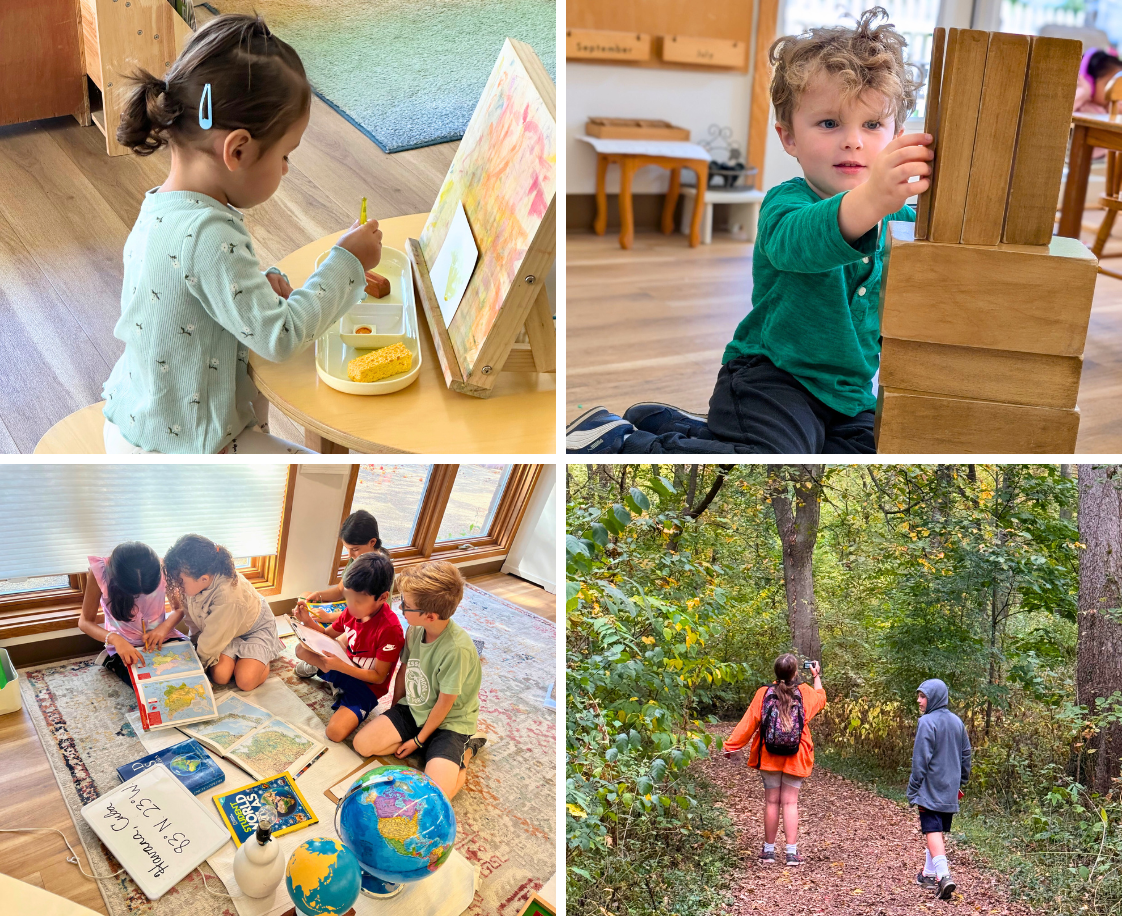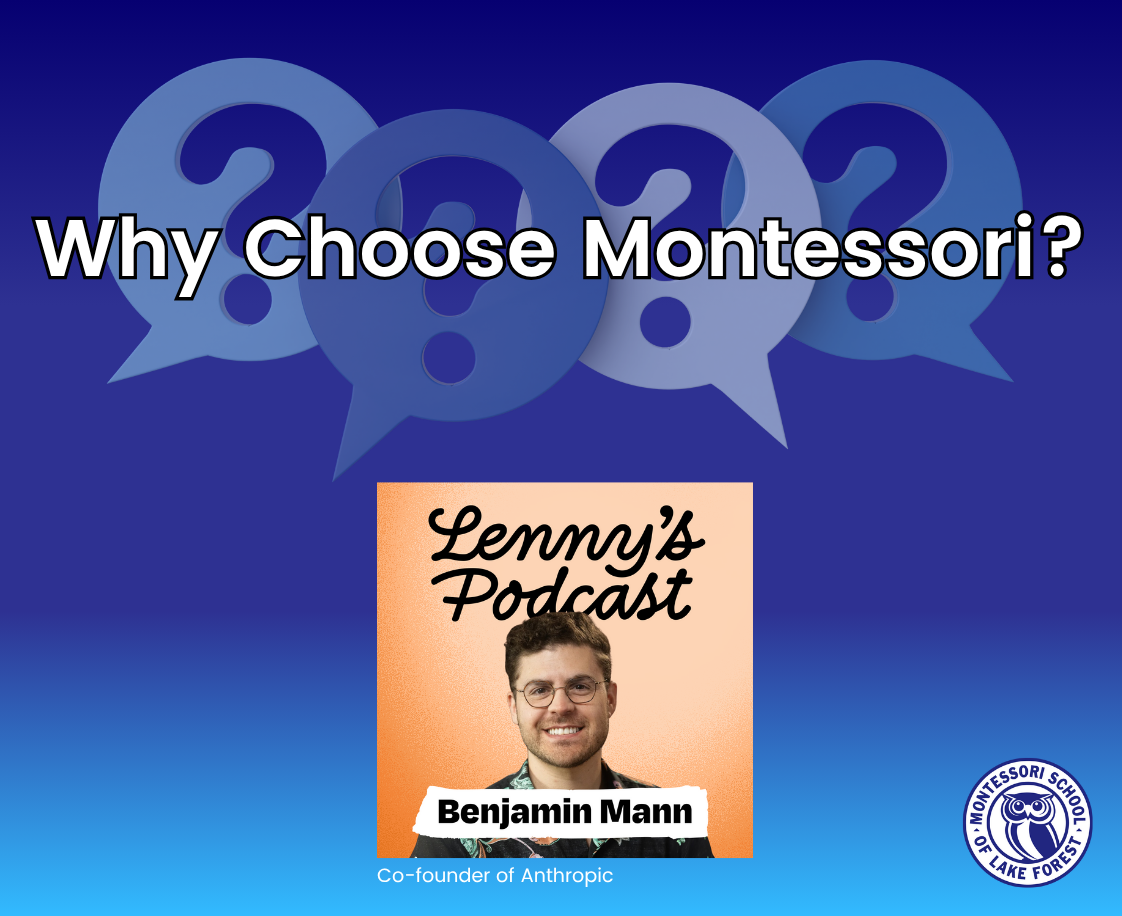
By Ann Jordahl
We have gathered tonight in support of our children’s Montessori education. And make no mistake, no matter how old our children are, we older MSLF parents continue to be guided by Montessori principles as we nurture our young adults.
What do we mean when we claim to offer good Montessori education? Lots of schools make this claim, so how does one assess quality? MSLF offers several proofs of its excellence. First, within the Montessori teaching community, MSLF is considered a good place to work. This is only in part due to its competitive salaries, and only in part due to the beauty of the campuses and the full range of services. MSLF attracts excellent practitioners because it offers them intellectual freedom. This intellectual freedom is the freedom to do one’s best work, to collaborate with colleagues, to disagree with colleagues, to think hard about Montessori philosophy and how best to apply it, how best to communicate about it. This school offers teachers something rare: the opportunity to do real Montessori, not just to talk about it.
Second, perhaps you have heard me describe how MSLF has become a community of people who think for themselves. We come together because we share goals and values, not because we all think alike. We do agree that the surest path to excellence at all ages is to combine good training, high standards, strong work ethic, perseverance, freedom to collaborate, agreeing to disagree. MSLF provides this path to excellence for all members of its community, young and old.
Our children are why it matters so much what kind of a community MSLF is. If we agree that we aim to provide the best Montessori education we can, then we know that our true goal is to interpret and apply the most basic of Montessori principles at all times. We may applaud our results as we witness them in our incredible alumni. But in order to “produce” such wonderful results, we here must concern ourselves first and foremost with the process of getting there. That process is Montessori education.
Montessori education is really an elegantly simple and efficient process. It is basically founded on one profound principle, a message that each child sends to the adult world. It took a genius to hear this call, and since she heard it, we now can hear it and heed it, too. The child’s eternal call to us is “help me to do it myself.”
Now, babies and toddlers offer many great examples of this desire to “do it myself” including their propensity to push or hit us if we get in their way! And their developmental achievements result from pretty obvious hard work. Once they master the very difficult art of walking, they are welcomed into our Toddler rooms, where they are asked to begin to grapple with self-care and awareness of others. Not only are they presented with the challenge of learning to use the toilet, but they are also guided to learn how to dress and undress, to prepare food, to eat in community, to wait their turn. This is not only cute. It is also profoundly moving to witness the earnest development of skills and self-respect in the young child who masters these tasks and who thus begins to master their self and their passions.
You notice that I use the word master, and that is exactly what I mean. Our Toddlers don’t just sort of do these tasks—they do them fully, and they are proud of doing them. They own their work, they own the pride of their accomplishments.
For instance, it takes the average Toddler student weeks if not months to master putting on their own shoe. This ultimate achievement may be accompanied by grunts, tears, deep focus, shrieks, giving up, trying again, lost chances to go out to play, perseverance, success—all of which, outside the classroom, you and I don’t see. We see the shoe on the foot, probably the “wrong” foot. We tend not to think of how it got there.
So maybe it’s easy for us to unintentionally obviate that achievement—and put the shoe on the child’s foot for them. Maybe we are in a hurry, or we are embarrassed about the left shoe going on the right foot, or perhaps we feel badly about leaving the child for long school day. And if this is the case, since we didn’t witness the hard work that went into the achievement, it’s pretty easy for us to put our child’s shoes on for them. And if they’re too old for shoes, it might be something else. Sound familiar?
There are all kinds of ways we can infantilize our children, by serving them too much, or controlling them too much. And once we start, when will we stop? We can do a child’s shoes or coat for them. We can carry their backpack. We can finish their sentences. We can say “we” instead of I. We can do their Blue House assignments for them, fight their Blue House battles for them. We imagine we can feel their pain, engineer their success.
Except that we really can’t. Not if our method is to respond to their call to us, “help me to do it myself.” And not if our ultimate goal is that our child becomes an adult who can “do it myself.” For you and I know that this is what it takes to be a problem solver in adulthood. And if someone is going to be a problem solver, then they have to be a problem solver. When do you start being a problem solver? Here at MSLF, we start from the beginning, by modeling problem solving for children. And one of the best ways to model problem solving is to allow others to solve their problems. With appropriate tools and support and time, we allow children to face and solve their problems.
So please join your children’s teachers and Maria Montessori. In the service of your child of any age, lay aside impatience or embarrassment or your own personal fulfillment. Do not kneel to serve your shoeless child. Do not weaken your 9-year-old by carrying their backpack. Do not allow yourself to become your 13-year-old’s scapegoat or whipping post. Rather, give your child a kiss, tell them what you expect of them and that you love them, say goodbye, and return when you said you would. The teachers and your child will take over from there. And you can walk away with your head held high, knowing that you are supporting your child’s education fully, not just with your checkbook and your words, but with your actions, too.
This year the faculty and staff and I have agreed that we will focus on raising the bar for ourselves so that we are completely confident that we “walk our Montessori talk” to the best of our ability. We invite you to join us, and we offer you our full support. We know how hard it is to be a Montessori parent.
I speak to you from the heart about the challenges and the possibilities that result, from walking this talk. There are people here who teach your children now, who once taught mine. They helped me walk away while I was dying with embarrassment at the timidity of one daughter. They helped me support a tiny daughter as she learned to stand up to a big tormentor. They said “we’ll take it from here” when I deposited a kicking, screaming, nearly naked four-year-old at their feet. Always they said, “She’ll be fine” and always, she was. Each time, the challenge was met, the child settled down, I settled down, the children became excellent students, family relations thrived.
While it was not easy to go through these experiences, I was not alone. The teachers helped me in the hallways and over the telephone, and I soon saw that despite my emotion, the problems weren’t mine. They were my children’s problems. And my children learned to meet their challenges, with the support and limits offered by their teachers.
My children are not special. They are just what we here at MSLF have learned to call “Montessori normal,” which is to say, they are problem solvers who know their limits, and know how to go after what they want. This is true of every one of your children, too.
So, fellow members of this community of people of all ages who think for themselves: We are focusing together this year on walking our Montessori talk. In big ways and small, let us take the necessary steps to answer the child’s call to “help me do it myself.” Let’s make sure that each of our children is the boss of their own shoes, and their own life, and that we set them an excellent example of just how that is done!
The post Walking Our Montessori Talk appeared first on Montessori School of Lake Forest.



